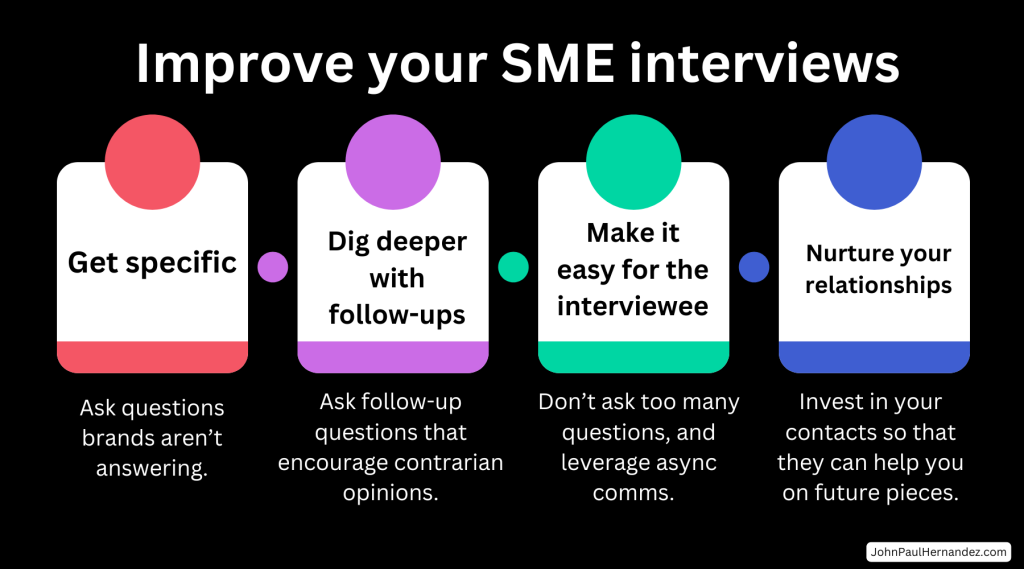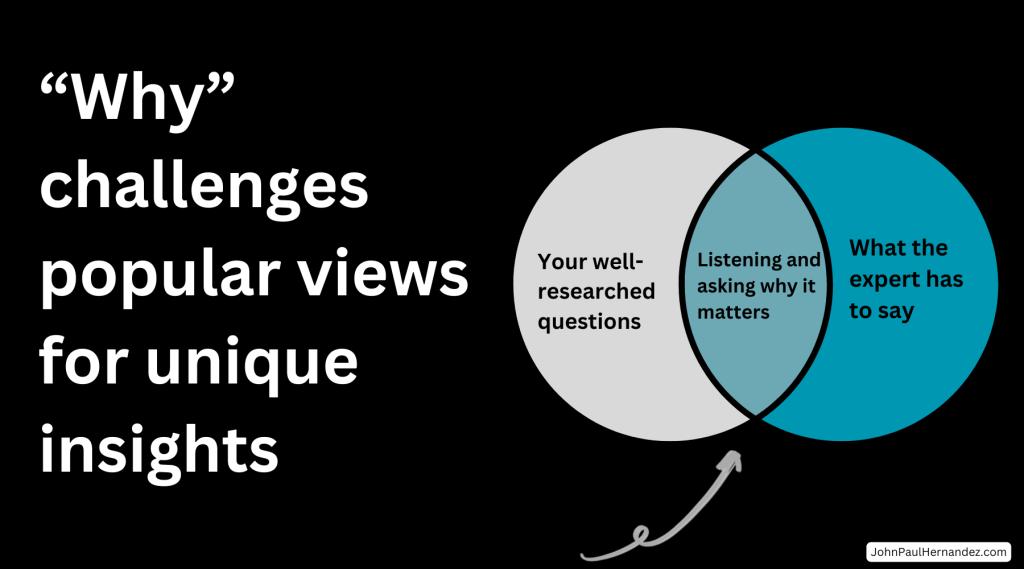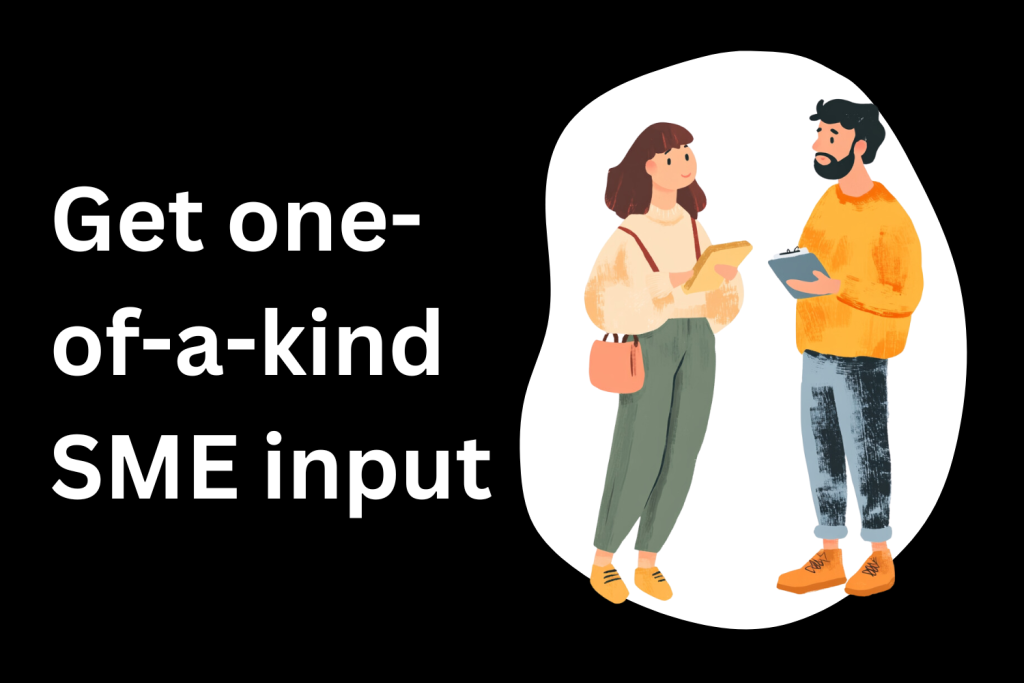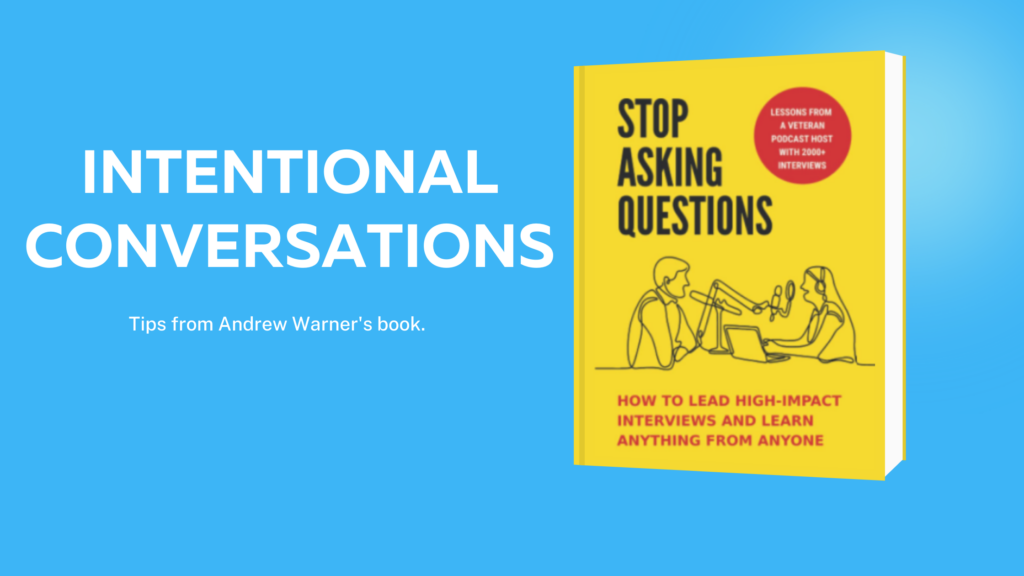This article by John Paul was originally published in Writefulcopy.com
Brands can publish new and original articles instead of echoing the same industry talking points online. One of the best ways to do that is through subject matter expert (SME) interviews.
Expert interviews add credibility to your piece. They also help share thought leadership and market trends. You can add important information from credible sources that help readers apply your content to their workplace or lives. That sounds good, right?
But then comes the interview.
You ask a few questions, and your expert gives short answers that you could’ve just Googled. The problem isn’t the expert’s answers. Everyone has value to share. The issue is that most people aren’t good at interviewing.
Why interviews aren’t second nature

Research to ask better questions, but then leave the door open for listening and following where the interviewee leads you
Most of us don’t like to listen (unless you’re one of the lucky few). When we get excited about something, we want to shout it out to our friends. When we meet someone new and they mention a common interest, our first instinct is to tell them about our passion.
Then, there are different levels of listening. Are you listening to respond immediately? Or are you listening and following the person’s journey? The second approach can reveal much more in-depth insight from anyone you talk to—especially for experts.
If you want the best interviews, you have to be a great listener and be able to encourage experts to explore their specialized knowledge.
Often, interviewers ask the same questions everyone else does, so you get the same content. This is a shame because it wastes a good SME interview opportunity to draw out professional experience. Instead, brands should thoroughly research the topic and find out what questions aren’t answered or publicly available. From there, writers can ask more informed questions that reveal original perspectives.
How to improve your SME interviews
You can strengthen your articles once you improve your subject matter expert interviews. These steps will enhance your SME interviews for original insight and niche knowledge:

Follow these subject matter expertise guidelines for better interviews that encourage unique insight from practical experience
1. Get specific with your research and ask better questions
Have you ever watched a Hallmark rom-com and the lawyer falls in love with a baker? There are a few of those. You notice something doesn’t look right about the baker. Throughout the movie, he wears a pristine apron; you never see flour on his arms or his perfectly groomed beard. Any baker would know this character has never baked a baguette, and the story loses credibility.
Audiences can feel the same way about content.
For example, a brand publishes a blog article about Facebook Ads. It communicates the same points as every article on the search engine results page (SERP).
The actual content might have all its SEO checks to rank on a search engine, but it misses the opportunity to add unique value to the reader. The brand fails to distinguish itself from competitors in order to win trust and convert leads.
Before you start contacting your SMEs, you need to know what to ask so you can encourage original insight.
If you ask a question like “What’s your take on [topic]?” it’s too broad, and you can easily research what the market thinks about your topic or keywords.
Instead, you can ask questions like, “Experts have said [opinion] about [topic]. Do you have a contrarian take that might challenge that idea?” You’ll automatically get a response that challenges readers and makes them think. The insight will also encourage readers to share the blog post on social media and give their thoughts about the content. When readers share articles, they increase your brand reach.
One great way to get started is to determine if your SME or a similar expert has already answered your initial questions. You might find answers through different sources, like a podcast episode or a previous article. Then, you can ask yourself, “Why does it matter?” to create better-informed questions that don’t exist on the internet.
2. Don’t be afraid to dig deeper after an answer
Once you’ve improved your questions, you’re already steps ahead to create a B2B article with original value and thinking. But your interview doesn’t have to stop after your initial questions.
Whether the SME submitted a form or interviewed you live, you can create follow-up questions to dig deeper—that’s where the real value is. And it starts by listening. Don’t think of your next question. Instead, pay attention to how the person writes or speaks.
Are they confident about their opinions? Are they expressing uncertainty about a trend? What are they leaving out? If you can find these potential golden nuggets, you can create a more valuable resource for your audience.
A few years ago, I had the pleasure of working with the publisher Damn Gravity to produce content for the founder of Mixergy, Andrew Warner. The project was for a pre-release campaign for the book Stop Asking Questions.
Throughout the process, I had a front-row seat to one of the masters of interviewers. Warner has interviewed the most influential people on his podcast, such as Rand Fishkin and Seth Godin. One of Warner’s techniques is called the Double-Barrel question.
Let’s say someone recently put an end date to their job on LinkedIn but didn’t announce anything. According to Warner, you can start with “Is it appropriate…”. So you would ask, “Is it appropriate to ask if you’ve transitioned from your job?” That’s much more inviting than asking if the person quit, got fired, or was laid off. For B2B content interviews, we can adopt a similar phrase for better questions and start with “Is it an assumption that…”.
While writers avoid assumptions, it doesn’t mean they have to abandon them. Your marketing team can use assumptions as an advantage for better questions.
For example, an SME may say, “We’ve found that if you want to improve user onboarding, you must create a personalized journey. That starts with a quick survey.”
The answer already has great insight, but you can get more perspective by following up with a question. You can ask, “Is it an assumption to say that a survey might deter users or frustrate them before they can use the app?”
The “assumption” helps frame the question so that the subject matter expert can support their opinion and explain the critical differentiator of why their answer works.
For example, they might answer with something like, “For a long, irrelevant survey. But we’ve found that a short three or four-question survey can nail down exactly what users need. They get their ‘aha’ moment in seconds when they start their journey.
That beats any new user experience by a long shot.” With more specific and unique answers, you can build an article that keeps readers reading and provides value that can’t be found on another site.
3. Make it easy for the interviewee
Industry experts are busy, and anytime they agree to an interview, we should make sure we appreciate and value their time. That means providing efficient communication with the most comfortable method for the expert.
Find out if the expert has a preference and choose that medium so you can win goodwill and get quality answers. But if you can, favor asynchronous communication, like sending a communication via Loom video messages or a survey with Google Forms. Async is a great way to eliminate location, time, and schedule barriers so the SME can quickly contact you whenever possible.
If you want to increase your response rate for interview requests, don’t send a list of 20 questions. Pick three to five questions that only an expert can answer that aren’t easily found online. Doing so ensures that you get the most value from the interview and that the professional can share their extensive knowledge.
4. Nurture your SME relationships
One of the most challenging parts of SME interviews is getting the expert’s attention, especially if they are an external contact. That’s why when you conduct a successful interview, you should continue adding value to that relationship.
First, you can share the article with the expert when it’s published. Not only do you provide a way to say “thank you” and show the expert’s value by sharing time with you, but they are also likely to post it on their social platforms—another win for marketing.
But after publication, don’t forget about your SMEs. Add them to a list and continuously engage with their social media posts. You’ll find that when you need them again, they’ll be more than happy to help. You can also start asking richer and better questions as you establish that relationship and understand how to communicate with the person for in-depth answers.
By maintaining SME relationships, you create strong partnerships that continuously provide unique value, thought leadership, and perspectives to your articles.
Creating interviews that stick: Start with “why”

Use the art of listening to facilitate better, more in-depth answers
As you develop your SME strategy for unique content, focus on the “why” throughout your process. Consider why a reader should care and how your article differs from others. For every claim you make, ask, “Why does this matter?” SMEs can add value by positioning content as authoritative, credible, and valuable—and it starts by asking better questions.
TLDR
- Get specific with research: Identify the questions brands aren’t addressing.
- Dig deeper: Ask follow-up questions to uncover contrarian opinions or unique insights.
- Make it easy for the interviewee: Limit the number of questions and use asynchronous communication so experts can respond anytime, even with busy schedules.
- Nurture SME relationships: Invest in your contacts to maintain valuable connections for future pieces.
If you want to produce winning SEO content that drives actions, contact me for your content plan.


